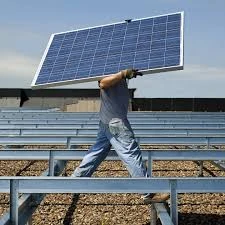Understanding the Efficiency of Solar Panels During Winter Months
The Efficiency of Solar Panels in Winter
As solar energy becomes an increasingly popular renewable resource, many people have questions about its effectiveness in various weather conditions—particularly in winter. Understanding the efficiency of solar panels in colder months is crucial for homeowners and businesses considering solar energy systems.
The Efficiency of Solar Panels in Winter
One of the primary considerations is the shorter daylight hours typical of winter. In many regions, the sun rises later and sets earlier, reducing the overall amount of solar radiation received. Furthermore, the angle of sunlight striking the panels changes as the sun’s position in the sky shifts. This tilt can lead to decreased energy production compared to the summer months when the sun is higher in the sky and provides more direct sunlight.
efficiency of solar panels in winter

Temperature plays another significant role in the efficiency of solar panels. While it may seem counterintuitive, colder temperatures can actually enhance the performance of solar cells. Most photovoltaic cells operate more efficiently in cooler conditions, as excessive heat can lead to decreased output. Therefore, despite the shorter days, solar panels can still perform well in winter, particularly on clear, cold days when sunshine is abundant.
However, snow can present a challenge. Accumulation of snow on solar panels can block sunlight and reduce energy production. Nevertheless, it is important to note that solar panels are typically installed at an angle, which helps snow slide off more easily. Additionally, the dark surface of the panels can absorb heat from sunlight, causing the snow to melt and slide off, often before it becomes a significant issue.
Furthermore, advancements in technology have led to the development of more effective solar panels with better performance under various conditions. Some panels are designed to capture diffuse light, allowing them to generate electricity even on overcast or cloudy days, which are common in winter. The use of bifacial solar panels, which can collect light from both sides, is also gaining traction and can improve overall efficiency.
In conclusion, while winter poses specific challenges for solar energy generation, it does not render solar panels ineffective. With shorter daylight hours and the potential for snow cover, the output may be less than in summer, but the cooler temperatures can actually aid efficiency. Homeowners and businesses can significantly benefit from understanding these factors and developing effective strategies to maintain and optimize their solar systems throughout the winter months. As solar technology continues to advance, the prospects for solar energy in all seasons look promising.
-
String Solar Inverter: The High-Efficiency Solution for Smart Solar EnergyNewsJul.14,2025
-
Revolutionizing Rooftop Energy with the Power of the Micro Solar InverterNewsJul.14,2025
-
Power Independence with Smart Off Grid Solar Inverter SolutionsNewsJul.14,2025
-
On Grid Solar Inverter: Powering the Future with Smart Grid IntegrationNewsJul.14,2025
-
Monocrystalline Solar Panels: High-Efficiency Power for the Future of Clean EnergyNewsJul.14,2025
-
Bifacial Solar Panel: A Smarter Investment for Next-Generation Energy SystemsNewsJul.14,2025







